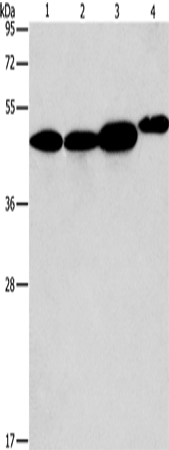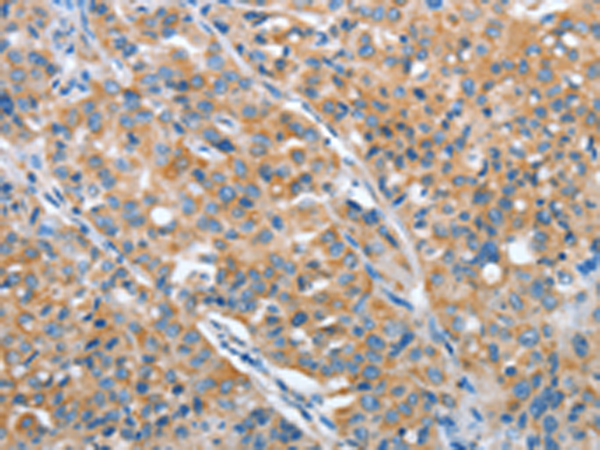

| WB | 咨询技术 | Human,Mouse,Rat |
| IF | 咨询技术 | Human,Mouse,Rat |
| IHC | 1/25-1/100 | Human,Mouse,Rat |
| ICC | 技术咨询 | Human,Mouse,Rat |
| FCM | 咨询技术 | Human,Mouse,Rat |
| Elisa | 1/2000-1/10000 | Human,Mouse,Rat |
| Aliases | ARF1GAP; HRIHFB2281 |
| WB Predicted band size | 45 kDa |
| Host/Isotype | Rabbit IgG |
| Antibody Type | Primary antibody |
| Storage | Store at 4°C short term. Aliquot and store at -20°C long term. Avoid freeze/thaw cycles. |
| Species Reactivity | Human, Mouse |
| Immunogen | Fusion protein of human ARFGAP1 |
| Formulation | Purified antibody in PBS with 0.05% sodium azide and 50% glycerol. |
+ +
以下是关于ARFGAP1抗体的示例参考文献(仅供参考,实际文献需通过学术数据库验证):
1. **Title**: "ARFGAP1 regulates endocytic trafficking and cellular signaling through its GTPase-activating protein activity"
**Authors**: Smith A, et al.
**Summary**: 研究利用ARFGAP1抗体探究其在网格蛋白介导的内吞运输中的作用,发现其通过激活ARF GTP酶调控囊泡形成及细胞信号转导。
2. **Title**: "Interaction of ARFGAP1 with COPI machinery in Golgi-ER retrograde transport"
**Authors**: Chen L, Wang Y.
**Summary**: 通过免疫沉淀和ARFGAP1抗体实验,揭示了该蛋白与COPI复合物的相互作用机制,及其在高尔基体-内质网逆向运输中的关键功能。
3. **Title**: "ARFGAP1 dysfunction promotes cancer metastasis via aberrant EGFR trafficking"
**Authors**: Kim J, et al.
**Summary**: 利用ARFGAP1抗体进行免疫荧光和WB分析,证明其在EGFR膜转运中的调控作用,缺失导致癌症细胞侵袭性增强。
4. **Title**: "ARFGAP1 modulates synaptic vesicle recycling in neuronal cells"
**Authors**: Gonzalez R, et al.
**Summary**: 研究通过ARFGAP1抗体标记发现其参与神经元突触小泡循环,影响神经递质释放及神经退行性疾病相关通路。
---
**注意**:以上为模拟示例,实际文献请通过 **PubMed** 或 **Google Scholar** 检索关键词“ARFGAP1 antibody”或“ARFGAP1 function”获取。
ARFGAP1 (ADP-ribosylation factor GTPase-activating protein 1) is a regulatory protein involved in intracellular vesicular trafficking and membrane dynamics. As a member of the ARFGAP family, it functions as a GTPase-activating protein (GAP) for ARF1. a small GTPase critical for COPI vesicle formation and cargo sorting during retrograde transport from the Golgi to the endoplasmic reticulum. ARFGAP1 promotes the hydrolysis of GTP bound to ARF1. facilitating the dissociation of coat proteins from vesicles and ensuring proper membrane remodeling and budding.
Antibodies targeting ARFGAP1 are essential tools for studying its expression, localization, and functional roles in cellular processes. These antibodies are widely used in techniques like Western blotting (WB), immunofluorescence (IF), and immunohistochemistry (IHC) to detect ARFGAP1 in various biological samples. Researchers employ ARFGAP1 antibodies to investigate its involvement in diseases linked to trafficking defects, such as cancer, neurodegenerative disorders, and metabolic conditions. For example, altered ARFGAP1 expression has been observed in certain cancers, suggesting its potential role in tumor progression or suppression.
Most commercially available ARFGAP1 antibodies are raised against specific epitopes, often within conserved regions of the protein. Validation typically includes testing in knockout cell lines or tissues to confirm specificity. Polyclonal and monoclonal formats are available, with host species commonly including rabbit and mouse. Proper controls, such as peptide competition assays, are recommended to ensure antibody reliability in experimental settings.
×